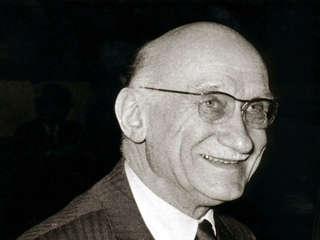
God and Caesar (Part II)
From Jeff Fountain’s book Deeply Rooted. (Part I here)
Schuman’s faith instructed and motivated all his political action.
Lex Schuman, for example, had embodied a tolerance for different faiths based on this biblical principle of equality. If Christianity taught that all were equal by nature, and all were children of the same God ‘regardless of race, colour, social status or profession’, states too should be treated as equals. The universal law of love and charity made every man our neighbour, he continued, and social relations in the Christian world had been based on this ever since. No race or nation could claim greater importance in God’s eyes.
Here also was the reason for Schuman’s discomfort with de Gaulle’s nationalism and the refusal of his invitation to go to London.
The roots of true democracy–the principle of equality, the practice of brotherly love, individual freedom, respect for the rights of the individual–all came from Christ’s teachings, in Schuman’s understanding. Democracy owed its existence to Christianity, he argued. Practical application of those teachings had transformed Europe through the centuries, resulting in liberal democracy. Democracy could not be improvised; it had taken Europe over a thousand years of Christianity to fashion it.
Christian principles had become the features of our civilisation, to which the seventeenth century rationalists owed their human and citizens’ rights, he posited, ‘which are essentially Christian’.
Schuman quoted from Henri Bergson and Jacques Maritain, two contemporary Catholic philosophers, explaining his understanding of democracy. Like Bergson, he had concluded that democracy was ‘essentially Evangelical’, since love was its mainspring. ‘Democracy will either be Christian or it will not be. An anti-Christian democracy will be a parody which will sink into tyranny or into anarchy.’
Crude democracy of the Hellenistic age based only on majority voting would end in a ‘tyranny of the majority’. True democracy required servanthood: serving the people and acting in agreement with the people. The goals had to start with peace and the means had to be works of peace.
‘Loving your neighbour as yourself’ was a democratic principle which, applied to nations, meant being prepared to serve and love neighbouring peoples.
For Schuman, a future, united Europe naturally had to be both Christian and democratic. The European story was deeply rooted in the Christian story. Cut off from those roots, Europe would lose the foundations for equality, human dignity, tolerance and compassion.
The democrat could not accept the state ignoring or opposing religion; for the state could not ignore the extraordinary effectiveness of religious inspiration in the practice of civic duty and in the protection against forces of social disintegration at work everywhere.
Over more than a thousand years before the Enlightenment revived Greco-Roman classical traditions, Christ’s teachings had deeply impacted Europe’s diverse tribes: Greek, Latin, Celtic, Germanic, Slavic, Magyar and Nordic, among many others. Diverse cultures had been woven into a common, albeit imperfect, Christian entity.
Obviously pride, selfishness and greed had blemished whole chapters of this story, often dismissed as ‘the Dark Ages’. In truth, these were centuries when many lights went on as monastic movements like the Celts and the Benedictines fanned out across Europe to found communities which became the building blocks of the emerging civilisation. Schuman had found refuge in some of these very communities in his flight to freedom.
From these monasteries had come Europe’s great universities and other centres of learning, led by scholar-monks.
Arts and music, politics and law, language and literature, hospitality and medical care, architecture and agriculture, schools and social institutions had all been shaped directly and indirectly through the centuries by the spread of Christ’s teaching and the Bible.
Modern times however had brought fresh challenges for the role of the church in an industrialised Europe. Simple Christian charity was no longer enough to cope with the systemic inequalities arising from the new social and economic forces at work, pitting worker against owner, class against class.
These were challenges Pope Leo had addressed in his watershed encyclical of 1891, Rerum Novarum, calling for a new solidarity in society based on God’s love for all the human family.
The Church needed to help the people respond to the new tensions in society. Neither socialism stressing class struggle, nor liberalism focussing on individualism, was the answer. Reconciliation and solidarity had to prevail.
The state had a responsibility to govern for the common good, the encyclical taught, respecting the various communities within society under the principle of subsidiarity.
Decisions therefore had to be made as locally as possible, allowing as much autonomy for the smaller communities and associations making up society. ‘As much government as necessary, as little government as possible’, in other words.
Solidarity, subsidiarity and equality were therefore all values based on Christ’s teaching, in Schuman’s view. Applied to the community of peoples, forgiveness and reconciliation–even with those presently seen as the enemy–were Christian imperatives.
This, he believed, had to be the way forward for post-war Europe. Political and economic structures would need to be built at all levels, local, national and European, on the democratic principle of ‘loving your neighbour’ applied to states and peoples. The atrocities against the Jews of which he had learned, still being perpetrated as Schuman sat out the war, would have to be rendered impossible by international guarantees for human rights. Such rights, rooted in the biblical teaching of Imago Dei–that each person was made in the Creator’s image – included the right to those things without which humans could not adequately function: food, shelter, clothing, education and relationships. Once more, the imperative to guarantee human rights was rooted in the command to love one’s neighbour.
Jeff Fountain
Director Schuman Centre

This Post Has 0 Comments